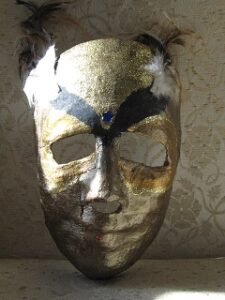Masquerade!/ Run and hide–/but a face will/ still pursue you!
from Phantom of the Opera by Andrew Lloyd Webber
It’s that time of year again. A time of costume parades and parties, and of masks.
Masks meant to scare, to mock, to mimic. Halloween wouldn’t be Halloween without the masks and costumes, a chance to dress up (or down) and pretend to be something or someone else for a night. To be part of the enchantment of the holiday. To enter the story of the mask. 
Masks, of course, are not just for Halloween. Over the centuries, they have served a variety of purposes.
- Masks, since the time of ancient Greece, have been used for theatre performances, like the noh masks of Japan, and for celebrations and festivals, like the Mardi Gras masks of New Orleans.
- Disguising identity. One has only to think of Batman, the Lone Ranger, and other superheroes to know that sometimes having a disguise can be very helpful, even it is only a half mask. Thieves and other bad guys concur; having a mask makes it difficult for anyone to identify you in a line-up as the bank robber.
- Concealment. In Phantom of the Opera, the Phantom wears a mask to hide his disfigurement. In The Man in the Iron Mask, King Louis XIV has a twin brother who has been imprisoned within an iron mask to conceal his relationship to the king.
- Ritual and ceremony. Around the world, you can find powerful masks representing gods, goddesses, spirits and elementals that are used to invoke those beings and their powers during ritual. Think of the Hopi of the southwest and their kachinas, or the Iroquois and their false faces, or other ritual masks from Korea, China, Peru, or from the various tribes of Africa.
Have you ever dressed up in a mask? Perhaps for Halloween, a costume party, or even as part of a theater production? It’s great fun to slip beneath a mask and become something or someone else for a while, isn’t it? To enter the magic of a story.
Just don’t become enchanted by the mask and forget to take it off, forget who you are.
Or forget your own magical story.

